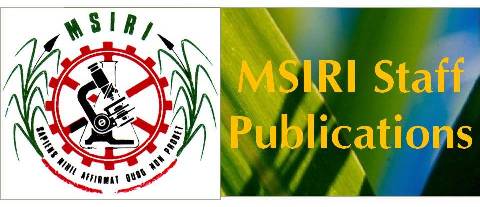Burnt versus green can harvesting: agricultural engineering challenges
| MSI05P4131 | |
| Meyer, E. Norris, C. P. Jacquin, E. Richard, C. Scandaliaris, J. | |
| Burnt versus green can harvesting: agricultural engineering challenges | |
| periodical article | |
| 2005 | |
| Proc. int. Soc. Sug. Cane Technol. | |
| 25 (2): 294-303 | |
| Also published in Int. Sug. J. 107(1281): 506-513, Sept. 2005 | |
| En | |
| En Fr Sp | |
| The Agricultural Engineering section of the ISSCT held a workshop between 12 and 17 October 2003 in Thibodaux, Louisiana, USA. The papers presented at the workshop were grouped under the following general headings: burnt versus green cane harvesting, land preparation and planting, trash management, crop maintenance and machinery costing and benchmarking. The five-day workshop program included two field tours in Louisiana as well as a post-workshop one-day tour of the Florida sugar industry. In this paper, the main issues emerging from the deliberations are discussed, and the issues that remain to be resolved are highlighted. The conclusions drawn were that modern chopper harvesters, under normal field and crop conditions, are capable of handling all but very heavy green cane crops. It was generally accepted that losses and extraneous matter levels are higher in green cane for both manual and mechanical harvesting systems. Furthermore, both manual and mechanical harvesting costs are higher in green cane compared to burnt cane. Best management practices for mechanical cane harvesting and planting were presented. While there are clear agronomic and environmental benefits in many environments from green cane harvesting, further research is required to study the impact that crop residues have on ratoon crops under cool or wet conditions. Alernative post harvest residue handling equipment and systems also need further evaluation, particularly as residues are a potentially important energy source. The principles and standards for a uniform machinery costing protocol based on the classical costing approach were presented and accepted. This would be beneficial when reporting machinery costs at workshops and congresses | |
| Sugarcane burnt cane green cane harvesting trash handling planting machinery costing benchmarking mechanization | |
| Mauritius | |
| Sugarcane: Cultural operations | |
| Mechanization | |
| 2005-02-21 | |
| en | |
| LIB | |
| CAT | |
| MECHAN |
